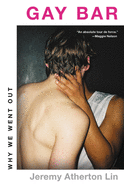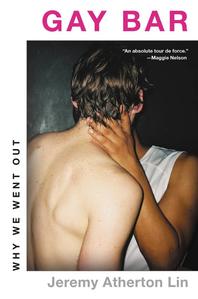
 Jeremy Atherton Lin brings a wise, wry voice to his masterful Gay Bar: Why We Went Out. This thoughtful study is part memoir, part research project, part travelogue and a large part classic essay-as-assay, seeking answers on the page. His subtitle indicates a wondering: Why did we go out? The answers are various; they change over time and of course are personal for Lin, but he progresses toward an understanding of what the gay bar really was, is and might be. "The question arises as to what distinguishes an enclave from a quarantine, and whether either is any longer necessary." If gay no longer needs a bar, is this a victory, or a loss?
Jeremy Atherton Lin brings a wise, wry voice to his masterful Gay Bar: Why We Went Out. This thoughtful study is part memoir, part research project, part travelogue and a large part classic essay-as-assay, seeking answers on the page. His subtitle indicates a wondering: Why did we go out? The answers are various; they change over time and of course are personal for Lin, but he progresses toward an understanding of what the gay bar really was, is and might be. "The question arises as to what distinguishes an enclave from a quarantine, and whether either is any longer necessary." If gay no longer needs a bar, is this a victory, or a loss?
"A salon of effete dandies engaged in witty banter, a lair of brutes in black leather, a pathetic spot on the edge of town flying a lackluster rainbow flag for its sole denizen--one lonely hard drinker. Of course, a gay bar can be all these things and more." Gay Bar is a personal history and a history in the traditional, researched sense: it relates Lin's coming-of-age as well as a world of gay bars, from the scintillating to the sordid, dating back hundreds of years. Seven sections are devoted to locations--bars or neighborhoods--and represent epochs, both in Lin's life and in the lifetime of the gay bar. Lin's specific bars are located in London, Los Angeles and San Francisco, over the course of decades. He ranges through LGBTQ topics including protests, hate crimes, the gay rights movement, relationships with law enforcement, Stonewall and Harvey Milk, and gay-bar topics of sexual consent, music, booze, poppers and pills. Lin considers race, gender and class, and questions exploitation and appropriation. His broader subjects include community and identity, bar and nightlife culture, people's relationships to place and more--this book has something for every reader.
Lin's writing is consistently intriguing, descriptive and lovely: "the cranes and glassy high rises hover like chaperones." As narrator he is by turns pensive, funny, self-deprecating, exasperated and reverent; he can be delightfully suggestive. "A pipe spilled chlorinated water. The brickwork had grown mossy down the length of its trajectory, like a viridescent trail-to-adventure on the building's belly." Gay Bar is enriched by the voices of others--thinkers in history, philosophy, literature and queer theory--but Lin never loses his own. This exploration is personal, deeply researched, smart and essential. --Julia Kastner, librarian and blogger at pagesofjulia
Shelf Talker: This superb, multifaceted book takes a close look at gay bars individually and as concept, in history and in the author's life, tackling big questions with wisdom and grace.

